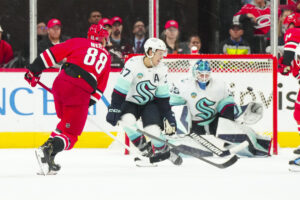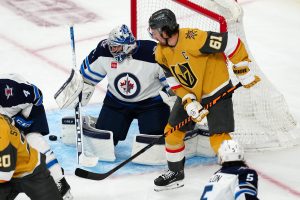If there was a non-stop flight from San Jose to Sweden, a pair of former San Jose Sharks could have booked one-way tickets on it. The Sharks parted company with two Swedes in the offseason, Melker Karlsson and Tim Heed. One needed to go, the other, not so much. We’ll look back at their Sharks tenure one last time.
Melker Karlsson
The more important of the two, at least in Sharks’ history, is Melker Karlsson. The team was right to let him go. Karlsson’s game had declined substantially.
Karlsson was never the most athletic sort, but he possessed one aspect to his game which mattered enormously. He was the Sharks most disruptive forechecker. He forced turnovers which led to quality scoring chances for his teammates.
At his best, he was underappreciated. He likely peaked in the franchise’s lone Stanley Cup Final appearance. The Sharks scored only 10 even strength goals in the series against the Pittsburgh Penguins. Karlsson played a major role in six of them.
None more critical or famous than Joonas Donskoi’s overtime winner in Game 3. He pressed two Penguins on the play, helped force the turnover which wound up on Donskoi’s stick.
Giving it everything he had, he finished the play without his stick and one of his gloves. In Game 6, his pressure set-up Logan Couture’s game tying goal. In Game 5, his race to the puck against two defenders led to Brent Burns‘ opening goal.
The Melkman
A Karlsson goal would bring the phrase “the Melkman delivers.” He’d finish his career with 60 goals and 52 assists in 396 games. He’d also play in 60 playoff games.
His peak offence came in his first season. Beginning the 2014-15 season with the Worcester Sharks, he was brought to the big club and quickly found himself on a line with Joe Thornton. Karlsson’s goals were commonly in greasy-goal category, coming off battles in front of the net. 11 goals and 24 points in his first season were both career bests.
His most famous goal came in the playoffs in 2017, an overtime game-winning snipe against the Edmonton Oilers. A goal for which one Oilers’ fan gave him a double barreled salute.
Over the course of his career, he’d play on all four lines. A coach’s favourite, Karlsson was moved up and down as situations needed. He became a core part of the penalty kill and remained reasonable effective there. It is believed the Sharks would have moved him at the trade deadline last season.
I’d have thought it’d make sense for a team to use a low-round draft pick on Karlsson; a depth forward with playoff experience and trustworthy on the penalty kill. He represented an insurance policy, likely a 13th forward. But even a small return didn’t appear, highlighting the magnitude of his decline.
The Decline of Melker Karlsson
A healthy Melker Karlsson was an asset to the Sharks. But it seemed his physical style took a toll. He became less and less effective as his athleticism faded. And while there is no stat for times falling on the ice, he probably led the team in it. It’d be hard to pinpoint a specific injury which robbed him of his game, but as it degraded, it became apparent he was no longer NHL material.
The team won’t miss his relatively meager contributions over the past few seasons, but they have absolutely missed the player he was before he began his decline.
Tim Heed
I vividly recall my first viewing of Heed on NHL ice. It came in a preseason game against the Anaheim Ducks. The smallish defenceman with the big shot was a player to watch. Alas, his defence was memorable for all the wrong reasons. Joseph Cramarossa scored four NHL goals in his brief NHL career. But in that game, Cramarossa looked like Patrick Kane when he dangled around Heed’s flat-footed defence.
I wouldn’t say I was optimistic about Heed at that point, but time was on his side. He paired with Joakim Ryan for the San Jose Barracuda and the duo was the best pairing in the AHL. Heed tipped in at over a point per game and both had stellar plus ratings.
Heed in the NHL
Heed’s game did translate to the NHL, but he never did seem to find a home with either Sharks’ coach, first with Pete DeBoer and later with Bob Boughner.
Heed’s best calling likely included a role in the power play. But the Sharks top right-shot power play defenceman was Brent Burns and to be blunt, even at his best, Heed isn’t Burns.
Heed proved to be a surprisingly good partner for Marc-Edouard Vlasic. In the 2018-19 season, an injury to Erik Karlsson resulted in some needed pair juggling. The Vlasic-Heed pair was surprisingly effective, with a 70 percent goals for rating (16 for, 7 against). Heed was largely benched for the playoffs (playing just three games), though, as Erik Karlsson made his return.
For reasons which were impossible to explain, the Sharks coaches decided Heed wasn’t a good fit for the 2019-20 team. DeBoer was positively allergic to pairing Heed with Vlasic despite their success the prior season. For DeBoer, Heed would often play under 10 minutes a night in 2019-20.
After DeBoer’s December firing, Boughner made him a line-up regular and Heed played double-digit minutes every game the rest of the season. With Burns and Karlsson eating up the power play ice time, Heed managed just a single power play point for the season (he played 38 games) and only five points total, after posting double-digit points in the prior two seasons.
Heed’s Blocked Path
Heed’s NHL journey in San Jose felt more like a case of blocked opportunities. With two of the top right shot defencemen playing ahead of him, Heed had limited chances to do what he does best. Thing is, other teams did need what he offered. Heck, even the Sharks needed what he offered. But the coaches didn’t see it that way.
By season’s end, it was obvious the team and player would part company. I’m a bit surprised no other NHL team has shown interest in Heed. I thought the Sharks would move him at the trade deadline, but that obviously didn’t happen. Now the team sees no need for Heed. The Sharks have Ryan Merkley, their top draft pick from 2018, expected to make a bid for a spot with the big club. Merkley is, no surprise, a right hander with a big shot.
Unlike like his former partner Ryan who remains in the league, the soon-to-turn 30 Heed doesn’t appear likely to return to the NHL. Heed ended his Sharks tenure with 29 points in 105 games. Even though his defence was sketchy, he wasn’t the liability he first appeared to be. He managed a positive Corsi in all three full seasons, finishing with a more-than-respectable 54.0 percent and a relative Corsi of 2.5 percent.
It’s also a bit of a mystery why the Sharks, if they were disappointed with Heed’s defensive game, never gave him a look at forward. The Sharks were starved for goals last season, and starved for right-shot forwards. Only one right-handed forward managed to exceed six goals and Heed’s shot was better than most of the team’s forwards. There was nothing to lose by trying that experiment.
Saying Adjö (Goodbye in Swedish)
The Sharks got everything they could from Melker Karlsson. For a few seasons, he delivered. By the end, he lost his ability to play at an NHL level. With Heed, the coaches found a way to get less than he offered. He was on the wrong team playing for the wrong coaches. It helped neither the player or the team.
Both Heed and Melker Karlsson are now playing in Europe. Heed in Switzerland, Melker Karlsson, now 30, back in Sweden. While it is where Karlsson belongs, it is certainly disappointing for Heed. He’s already managed six goals in his first 20 games with Lugano, equaling his NHL career total.
It’s unlikely either will ever play in the NHL again.
Main Photo:






